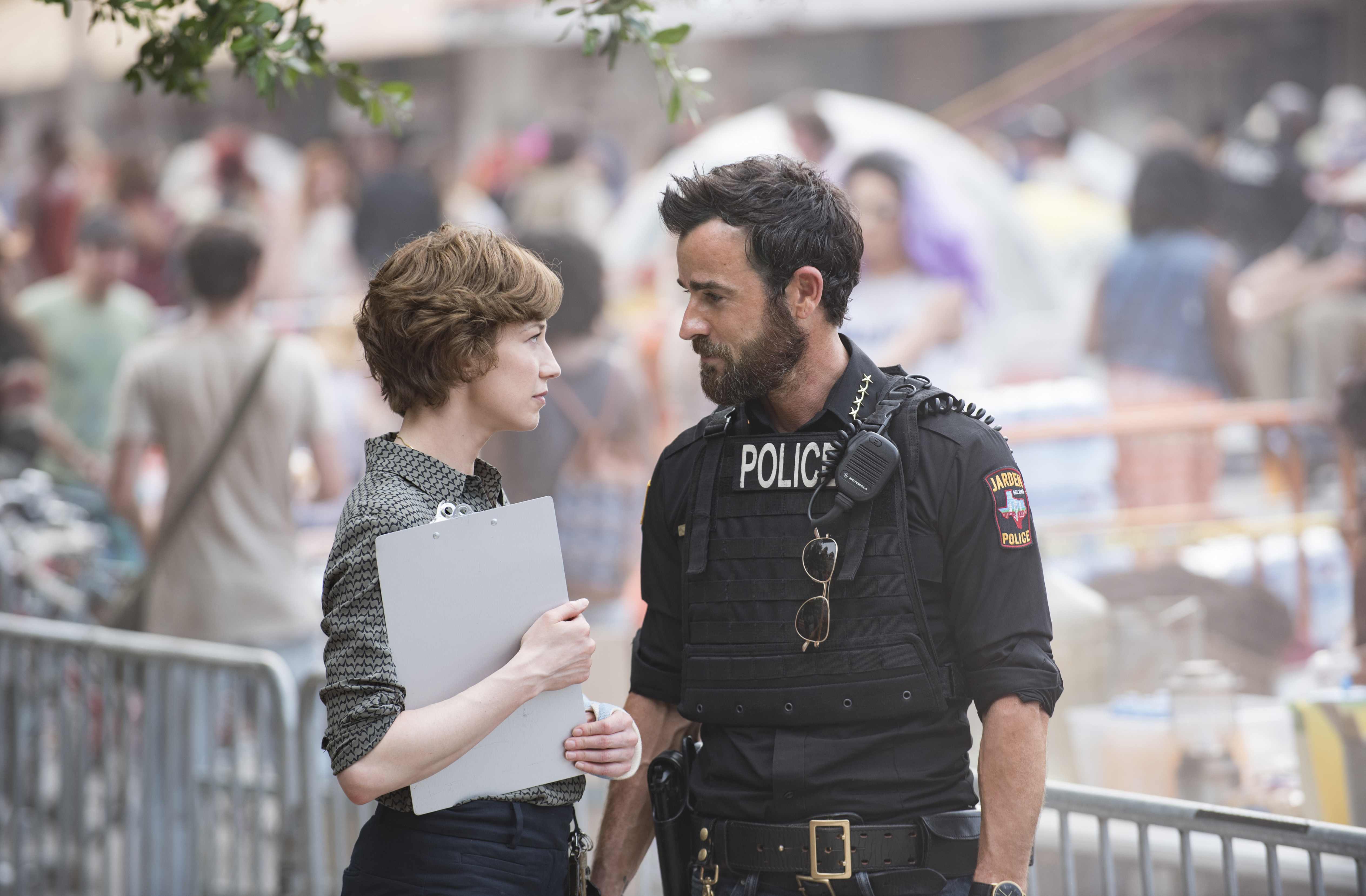The beautiful impenetrability of The Leftovers
On this week's heart-wrenching episode of HBO's extraordinary drama, we see the beautiful and the damned


A free daily email with the biggest news stories of the day – and the best features from TheWeek.com
You are now subscribed
Your newsletter sign-up was successful
The Leftovers is a labyrinth of a show; watching each episode takes you down a series of tangled pathways toward never-ending thickets of spiritual, cultural, philosophical, and psychoanalytical interpretations of what we're seeing on-screen.
This show is beautiful. But it's also confusing.
Certainly, anyone who tries to parse the meaning of the closing moments of Sunday night's "Don't Be Ridiculous'" will struggle. The action suddenly shuttles off to Australia, where we're introduced to a small-town police chief coincidentally (or, you know, not so coincidentally) named Kevin (though he's silver-haired and soft-bodied, at the latter end of middle-age), who smashes his car into a kangaroo and scoffs off a deputy who wants to leave just a little early so he can tend to his dog.
The Week
Escape your echo chamber. Get the facts behind the news, plus analysis from multiple perspectives.

Sign up for The Week's Free Newsletters
From our morning news briefing to a weekly Good News Newsletter, get the best of The Week delivered directly to your inbox.
From our morning news briefing to a weekly Good News Newsletter, get the best of The Week delivered directly to your inbox.
These are clear, intentional echoes of season one Kevin Garvey, who struck a deer with his car and had, shall we say, a rather complicated relationship with the canine kind — so, when a group of hard-bitten, hard-riding frontier women show up insisting that Aussie Kevin is a quasi-Messianic figure, it doesn't feel wholly implausible. After all, the meticulous surreality of The Leftovers' world lends itself to a myriad of interpretations — Aussie Kevin is a Jungian double of Hunky Kevin; Aussie Kevin is a transmutation of Hunky Kevin's consciousness; or Aussie Kevin is an actual reincarnation of Hunky Kevin after the seventh anniversary of the Departure fulfills Matt Jamison's predictions of Doomsday.
These paths are all intellectually delectable. But let's also admit that The Leftovers is at its best when the center of its maze is the human heart. And the aching, often-on-the-verge-of-breaking heart of The Leftovers is Nora Durst (Carrie Coon).
This is the woman whose life is the tragedy of the post-Departure world writ small: Though she has suffered the kind of loss that most clumsy-tongued, if well-intentioned, people would say they couldn't survive, Nora must still cycle through the motions of going to work and buying milk and making nice with the neighbors and being sympathetic to her partner's woes (even if his woes entail possibly being the key to saving all life on Earth). Her storylines and solo episodes have best wed the show's hellzapoppin' weirdness with a very real, very emotionally grounded depiction of grief: In season one's "Guest," she was a study in blunt endurance, making it through the day-to-day, even if she was still cocooned inside her pain; season two's "Lens" parsed through her lingering guilt; and "Don't Be Ridiculous" is all about Nora reckoning with the cruel truth that her insurmountable loss will not insulate her from everyday annoyances and far deeper devastations alike — whether it's a matter of the parking lot scanner repeatedly spitting back her ticket as the cars queue up behind her, or the biological mother of her adopted daughter deciding to abandon the barefoot cult life, invest in some sensible cardigans, and pursue full custody.
Nora is a gender-swapped Job, a character defined by her suffering — her parents' deaths in a house fire; the departure of her husband and children (and her bloviating brother's cruel disclosure that hubby was sleeping with the kindergarten teacher); and, now, the loss of Lily. She's not quite the sad-sack she was back in season one, weeping in the arms of Holy Wayne; nowadays, she's Special Agent Nora Durst with the Division of Sudden Departures, and she's shacking up with Hunky Jesus Kevin. Yet the trappings of her new life — the formidable job, the newfound friendships in Miracle, and lots of make-out time with Kev the Redeemer and his washboard abs — function like her plaster cast: They insulate her from her brokenness, but only for a time; once the cast comes off, all that's left is a shriveled limb.
A free daily email with the biggest news stories of the day – and the best features from TheWeek.com
Carrie Coon has inspired rhapsodies of well-earned praise, but her work in "Don't Be Ridiculous" is exemplary, even for her. From the first moments of the episode, she deftly conveys the agitated soreness that still ticks and thrums under Nora's protective bravado, when she confronts the widow (Brett Butler) of Miracle's beloved tower-dwelling dude, who is attempting to pass his sudden death from a heart attack as a departure (working with her pastor, Matt Jamison, to hide his body).
In her few brief scenes, Butler conveys a careworn devotion to her husband, even though she spent the past seven years of her life looking up at him from afar. She takes solace in what her husband represented to the people who fed him and tended to him; in how he became an inchoate emblem of everything they lost, and all that remained. No wonder, then, that Nora shows such viciousness in debunking his departure. "Can't you give the man a little grace?" Matt pleads. Nora coldly retorts that she will dig up the body; later, she slaps a full-color photograph of the man's bloated, bruised, and still very earthly body over a mural depicting him as an ascending saint. The widow howls that Nora is "a heartless bitch," and in this instance, she's not wrong. Then again, Nora's fury — very specifically at anyone who'd fake a departure, and more generally at her lot in life — is entirely justified. The Leftovers may be a brain-teaser of a show, proudly willful in its obscurity, but moments like this prove that it has a profound empathy as well.
This empathy is very present in this episode's most transparently ridiculous storyline — when Mark Linn-Baker of Perfect Strangers fame calls Nora, asking if she'd like to be reunited with her children. Linn-Baker is aligned with a group of scientists who claim to have perfected a transmogrifying device that uses Low Amplitude Denziger Radiation (or, LADR, or, you know, ladder) to recreate the conditions of each departure and potentially reunite the left-behind with their lost loved ones. In the first two seasons, the fact that the entire cast of Perfect Strangers departed, and that Linn-Baker, who played the schlubby straight-man, was left behind, played like a bit of low-key hipster snark. Now, in Linn-Baker's haggard face, we see the brutally human pain throbbing inside the hard shell of that snark. "Four series regulars," he says. "Three go, and one stays." His voice taut with rage, he asks Nora if she knows the odds of that happening, and without even thinking, she answers, "one in 128,000."
She was a series regular, too.
The scene is deeply sad and chilling: Though Nora asserts that Linn-Baker is suicidal and the LADR device doesn't reunite people with their loved ones, "it incinerates them," she still sits in her hotel room, chain-smoking (and looking very Guilty Remnant in her white robe) as she watches the video consents of the many people who, "of sound mind and body," went into the unknown. Unlike the Widow Tower Guy or Matt Jamison, Linn-Baker sees no purpose in his suffering, and all he wants is "to take some f--king control."
This concept of control is elemental to Nora's pain, and her understanding of her position in the world. Her barely-suppressed agony while watching Lily play in a sandbox, and her tense exchange with a palpably worried Christine, suggest a messily protracted custody battle. Yet, later in the episode, she reveals that she didn't fight Christine in court because she was so aggrieved at seeing a mother missing her child. This may be true, in part. However, Lily's adoption seemed pretty iron-clad back in season two, and the fact that Christine left her crying baby on the filthy floor of a gas station would factor significantly in Nora's favor — for joint custody, at least. Nora's decision to cede custody is at once altruistic and masochistic. It is, at its core, the same impulse that prompts her to tattoo her children's names on her arm, then realize that she can't bear explaining the tattoos to random strangers and get a bad cover-up of the Wu-Tang Clan logo; and, finally, to break her own arm in a car door, so she can cover up that cover up.
Nora unburdens herself of this story to Erika Murphy (Regina King), who has, in the three years since she stood on a bridge and waited to be blown up, accepted the things she can't control and embraced the few things she can. Yes, her beloved daughter is gone; but she had a body to bury — and in a world where beams of specialized radiation can (hypothetically) replicate a terrifying act of God (or was it?), that is an incredible mercy. King is so beautifully receptive, and subtly expressive as Erika listens to Nora call herself "Nora Cursed" (Coon lifts her voice, trying to play the line off as a sad joke). Erika is a physician, grounded in the science of the body — which is governed by innate processes and symptoms, while remaining, at times, wholly unknowable. And yet, when Nora asks her how she's coping with losing her own family, all she can do is smile: "I bought a trampoline," she says.
The sight of Erika and Nora, bouncing like children, their bodies in kinetic bliss, is one of the series' most lyrical images. It doesn't need analysis. It conveys something very elemental — that hope comes in moments, rare and all-too-fleeting, but still powerful enough to sometimes balance the world's horrors. Sometimes. When she's back home in Jarden, Nora gets a call from the LADR physicists; they want to know if she can meet them in Australia with $20,000 in cash. Without pausing, she says yes. And our main characters are about to bring their troubles to the weirdness Down Under.
Laura Bogart is a featured writer for Salon and a regular contributor to DAME magazine. Her work has appeared in The Atlantic, CityLab, The Guardian, SPIN, Complex, IndieWire, GOOD, and Refinery29, among other publications. Her first novel, Don't You Know That I Love You?, is forthcoming from Dzanc.
-
 Will increasing tensions with Iran boil over into war?
Will increasing tensions with Iran boil over into war?Today’s Big Question President Donald Trump has recently been threatening the country
-
 Corruption: The spy sheikh and the president
Corruption: The spy sheikh and the presidentFeature Trump is at the center of another scandal
-
 Putin’s shadow war
Putin’s shadow warFeature The Kremlin is waging a campaign of sabotage and subversion against Ukraine’s allies in the West
-
 Walter Isaacson's 'Elon Musk' can 'scarcely contain its subject'
Walter Isaacson's 'Elon Musk' can 'scarcely contain its subject'The latest biography on the elusive tech mogul is causing a stir among critics
-
 Welcome to the new TheWeek.com!
Welcome to the new TheWeek.com!The Explainer Please allow us to reintroduce ourselves
-
 The Oscars finale was a heartless disaster
The Oscars finale was a heartless disasterThe Explainer A calculated attempt at emotional manipulation goes very wrong
-
 Most awkward awards show ever?
Most awkward awards show ever?The Explainer The best, worst, and most shocking moments from a chaotic Golden Globes
-
 The possible silver lining to the Warner Bros. deal
The possible silver lining to the Warner Bros. dealThe Explainer Could what's terrible for theaters be good for creators?
-
 Jeffrey Wright is the new 'narrator voice'
Jeffrey Wright is the new 'narrator voice'The Explainer Move over, Sam Elliott and Morgan Freeman
-
 This week's literary events are the biggest award shows of 2020
This week's literary events are the biggest award shows of 2020feature So long, Oscar. Hello, Booker.
-
 What She Dies Tomorrow can teach us about our unshakable obsession with mortality
What She Dies Tomorrow can teach us about our unshakable obsession with mortalityThe Explainer This film isn't about the pandemic. But it can help viewers confront their fears about death.
